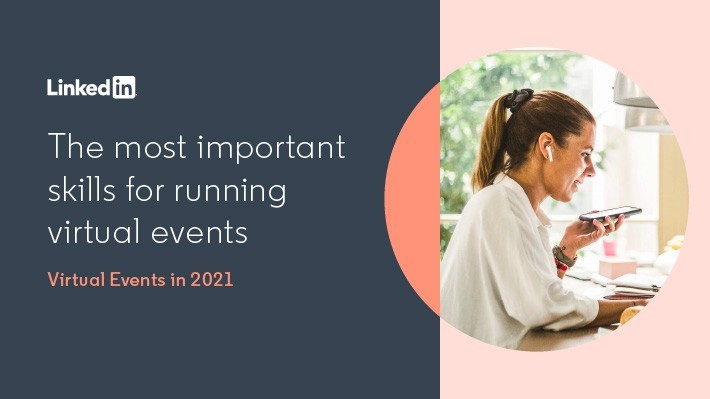The most important skills for running virtual events
Events aren’t what they used to be – they’re a whole lot more. The rise of virtual has greatly expanded the role that events can play in marketing strategies – and in the process it’s expanded the skills involved in planning and executing them.
A successful virtual events marketer doesn’t just organise events. They produce and direct video content, grasp the pros and cons of different technical platforms, know how to moderate online comments and discussions, and put together digital marketing campaigns that amplify the impact of their content.
Virtual events marketers are moving quickly to invest in these skills. In LinkedIn’s report, Virtual Events – A New Reality, more than a third of event marketers in EMEA want to increase their technical platform skills. A similar proportion are hungry to learn skills in visual design, networking and running advertising campaigns.
Event marketers have always been experts at aligning with sales, helping to generate leads, nurture prospects and move conversations forward. With the rise of virtual events, their expertise is increasingly in demand at the top of the funnel as well. The events they design act as an engine for building awareness, and produce video content that can be used for always-on campaigns that last far beyond the event itself.
As part of our new LinkedIn Virtual Events Pocketbook, we asked LinkedIn’s event marketing experts about the most important skills that the rise of virtual has added to the event marketing toolkit. Here’s what they see as the key capabilities you should try to build this year:
Video production expertise
The quality of sound and visuals has a huge impact on the engagement levels that a virtual event generates. It’s often worth investing in external production expertise to help with setting up shots, advising on lighting and camera angles and monitoring sound and picture quality. However, you’ll get so much more from these resources if you have a decent understanding of video production principles yourself.
The expert view:
As a virtual event marketer, you become more of a producer. You’ll need to put together a technical Run of Show to manage tight turnarounds between speakers, integrate multiple video streams, design the lower thirds of your screen and prepare branding for your speakers in advance.”
Dania Riad
Events Marketing Manager, EMEA, LinkedIn Sales Solutions
Platform knowledge
A technical knowledge of event platforms helps you to choose the right option for different objectives, and ensure you have the capabilities you need for interactive Q&A sessions, breakout rooms, audience polls and other elements. The more technical skills you have, the more confidently you’ll be able to innovate, and keep delivering fresh audience experiences. It also helps you to manage stakeholder expectations in advance, discussing the metrics you’ll have available and how you can track success.
The expert view:
It comes down to understanding the platform options and the technical limitations that may exist, so that you can align your event strategy aligns with the capabilities of the virtual tools you’re using – and map out the audience experience.”
Rena McGrath
Senior Executive Producer, Strategic Events, LinkedIn
Event moderation
Virtual events take place on several different levels simultaneously. A live panel discussion will involve guests answering one set of questions from the panel host while audience members post their own discussion on an event page – or share comments as part of the live video stream. Your skills as a moderator help to link these simultaneous experiences together: answering audience questions directly – and feeding them into the main event discussion.
The expert view:
During a live event, managing real-time Q&A sessions becomes especially important. It helps to keep the momentum of the conversations going, avoids losing the audience and ensures that the content lands well.”
Michelle Tan
Marketing Manager, APAC
Social media marketing
Social media skills go a long way when it comes to virtual events. They’ll help you to select the right platforms to amplify your event, co-ordinate promo campaigns, generate organic reach through hashtags – and add interactivity to the event content itself.
The expert view:
In our experience, it’s the importance of social media skills that differentiates virtual events from in-person ones. They help to build a full journey for your participants, creating stand-out and excitement and adding important elements of fun. For one game show-themed event, we organised an entire three-month calendar of social media content in advance.”
Giulia Vianna
Associate Marketing Manager, LinkedIn Marketing Solutions, LATAM
Project management
Virtual events involve managing the expectations of a range of different stakeholders regarding technologies they’re not necessarily familiar with. This brings your project management skills to the fore. You’ll need to be able to understand the full implications of every ask and creative idea, from the supply chains required to deliver gifts and event packs to people’s homes – to the question of how to pass audiences between keynote speakers and breakout rooms.
The expert view:
The stakeholder management side increases with virtual events – and so project management skills become really important. Planning out your journey flow and workflow well in advance makes a big difference.”
Dania Riad
Events Marketing Manager, EMEA, LinkedIn Sales Solutions
Speaker coaching
Presenting virtually requires subtly different skills to presenting in-person – and that could mean that your speakers need additional support. Aim to give clear briefs around what the audience will be looking for – and the timeframe that your speakers have to get their points across. Suggestions on how to edit down runtime, incorporate storytelling elements and incorporate visual elements could help as well.
The expert view:
Be prepared to manage speakers more proactively. Coach them through how to position themselves onscreen, how they can set up lighting to the best effect, even little details like avoiding chairs with wheels – because everyone tends to fidget!”
Grace MacDonald
Marketing Manager, Content and Social, LinkedIn Marketing Solutions EMEA
GDPR compliance
Engaging audience members at home can create a range of new compliance requirements. It’s important to understand how you can ask for address details and send event kits in advance, without falling foul of GDPR and other regulations.
If you’re hungry to build these types of skills, you’ll find courses on LinkedIn Learning that can help. We recommend Live Video Streaming: Essential Skills with John Dudley for a great overview of the video production side, How to Create and Run a Brilliant Remote Workshop with Dave Birss for some entertaining insights that can apply to moderating panel discussions, Executive Presence on Video Conference Calls with Jessica Chen for tips to share with speakers and GDPR Compliance: Essential Training with Mandy Huth to get up to speed on data and privacy considerations.
Want more insights on virtual events skills and strategy? You’ll find them in our virtual events pocketbook guide.



